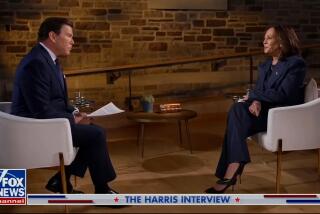It’s Not What’s Said but Media Spin on What’s Said
- Share via
There they went again.
Not debaters Al Gore and George W. Bush, but TV’s Boston beanbags, who swiftly judged them, hemorrhaging their verdicts all over a medium that Paddy Chayevsky defined in “Network” as “the common rubble of banality.”
So let the banality continue. And what better venue for it than these debates, which themselves resonate entertainment values bleeding through news against the Muzak of prepackaged rhetoric?
The excerpts that newscasts choose to show from this debate will undoubtedly contain some of the evening’s snappiest sound bites, and they will assume a life of their own in coming days, becoming a common wisdom that will likely be reflected in the polls.
Some of those clips will undoubtedly show Gore and Bush simultaneously, as ABC, CBS, CNN and--especially--the Fox News Channel telecast portions of the debate on split screens, half showing a candidate talking, half showing his opponent reacting, at once providing a sort of instant counter-spin and diverting from the speaker. Well, as long as it made for good TV.
Just how good? Replicating something CNN once did, MSNBC hooked up some technology to members of a focus group that measured their emotional responses throughout the debate. Replayed afterward, it was at once compelling and meaningless.
Bottom line: Neither Bush nor Gore drooled uncontrollably or fished ball bearings from a pocket and did a loopy Capt. Queeg, allowing media and the rest of America to judge them on other aspects of their performances.
If ABC News analyst George Stephanopoulos was right about voters “who know the least” being targeted by the debaters, then it may matter less what the candidates said than how media observers characterize what they said. And even more important, how they said it.
Take the Fox News Channel, for example.
From Mara Lisson: “They both did well,” and “Bush more than held his own.” Gore, she added, “kept some of his bad habits in check, but he had other habits, like heavy sighing and laughter, that he didn’t keep in check.”
From Morton Kondracke: Bush “did not make any mistakes. He looked up to the job.”
From Fred Barnes: “I thought this was Ronald Reagan versus Jimmy Carter, and Ronald Reagan won again.”
On ABC, Stephanopoulos thought Gore dominated the debate. Cokie Roberts wondered: “Was Gore too much of a bully; was Bush too shy?”
As always, the most predictable assessments came from those with the most at stake. So why bother to ask them? Bad habits die hard.
On CBS, Dan Rather got the skinny from Bush’s running mate, Dick Cheney, who, after carefully pondering this, found the Texas governor “calm, cool, confident, poised.” Rather tried another tack, asking in what area Bush needed to improve. “I think he’s exactly where he needs to be,” Cheney replied.
Next came Gore running mate Joseph I. Lieberman, who told Rather “honestly” that the vice president “scored a 10.”
These assessments did not change when Cheney and Lieberman later appeared separately on CNN.
There is a pattern to these things. First, media set the bar for each candidate, with “Hardball” host Chris Matthews generating the quote of Tuesday evening when saying on MSNBC in advance of the debate: “A win is not losing.” Nor is a loss winning, he neglected to add.
Here was NBC reporter Campbell Brown about Bush: “The bottom line for him is to hit a home run by not making a mistake.” On the Fox News Channel, reporter Carl Cameron said Bush’s advisors felt he’d succeed against Gore if he could “be his best and show his heart.” Gore, someone else said, had to be “real and show he can deal” with “real people and real problems.” On CNN, Judy Woodruff wondered whether Gore had to demonstrate “a warmth, a likability.”
Which candidate did what he had to do? After the debate, both ABC News and CNN hashed it over in town meetings with voters who were undecided before Tuesday night. Not that their opinions were the final word.
“Tomorrow,” trumpeted an ABC promo for “World News Tonight” with Peter Jennings, “find out what the debates really mean.”
More to Read
Get the L.A. Times Politics newsletter
Deeply reported insights into legislation, politics and policy from Sacramento, Washington and beyond. In your inbox twice per week.
You may occasionally receive promotional content from the Los Angeles Times.










